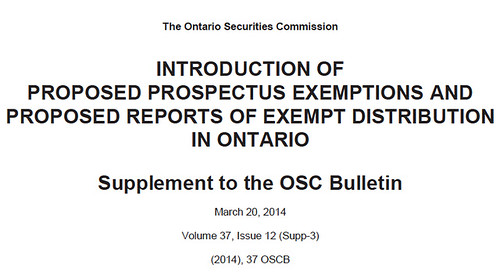Ontario Ready to Allow Equity Crowdfunding, Four Other Provinces Poised to Follow Suit
 Canadian startups in may soon be able to raise money in Ontario through equity crowdfuding.
Canadian startups in may soon be able to raise money in Ontario through equity crowdfuding.
On Thursday, the province’s securities regulator introduced a set of proposed updates to securities laws that would allow crowdfunding for equity, where backers don’t just make a donation in exchange for a reward but are actually investors buying a piece of the company.
So for, Saskatchewan has been the only province to legalize the practice. While Ontario appears poised to become the second province to move forward, others look likely to follow suit; in a document, the Ontario Securities Commission says it worked closely with its counterparts in Quebec, Manitoba, New Brunswick, Nova Scotia and Saskatchewan to draft the rules and that those other provinces will be coming out with similar, or the same, regulations in the near future.
Under the proposed rules, companies would be allowed to raise up to $1.5 million a year through equity crowdfunding portals.
Individual investors would be allowed to invest up to $2,500 in any single offering. Investors would be able to invest a maximum of $10,000 a year through equity crowdfunding portals. Those measures are intended to protect investors due to the higher risks that the OSC associates with equity crowdfunding. Investors would also have 48-hours to change their minds and withdraw funding.
Under the proposed rules only companies that are incorporated in Canada, have their head offices here and have a Canadian majority on their board of directors would be allowed to offer securities through equity crowdfunding portals.
Like existing crowdfunding sites, equity crowdfunding offerings would also have a time limit—the OSC proposal calls for a maximum of 90 days. Companies would also have to establish a minimum amount of money the want to raise through an equity crowdfunding round and would not receive any funds if they didn’t meet that amount.
The OSC is also proposing limits on the type of securities that could be issued through an equity crowdfunding round, banning what the OSC describes as “novel or complex securities,” like derivatives. The OSC is also setting out rules for crowdfunding portals. They would be subject to similar regulations to those that already apply to exempt market dealers: licensed securities dealers who sell securities that don’t require a the issuer to provide a prospectus.
That prospectus exemption is really the key the who equity crowdfunding proposal in Ontario. A prospectus is a detailed document that companies issuing securities are generally required to show prospective investors. But for some companies, especially startups without revenue, it’s impossible to fulfil the requirements of a prospectus which include providing three years of audited financials.
Companies issuing securities through equity crowdfunding portals would have to provide some some disclosures—but not a full prospectus.
The OSC is also proposing three other new prospectus exemptions, including two that already exist in other provinces: a friends, family and business associates exemption, which make is easier for startups to raise money from people the owners are close to; along with a offering memorandum exemption, which allows companies to issue an offering memorandum, a document somewhat less arduous to prepare than a full prospectus.
The OSC is also proposing a prospectus exemption for companies that are already traded on the Toronto Stock Exchange, the TSX Venture Exchange and the Canadian Securities Exchange. It would allow companies that are already public to issue more securities, in some cases, without a new prospectus.
The OSC will be taking comments on the proposals for the next 90 days and could change them before they go into effect. It’s clear when exactly that will happen.











